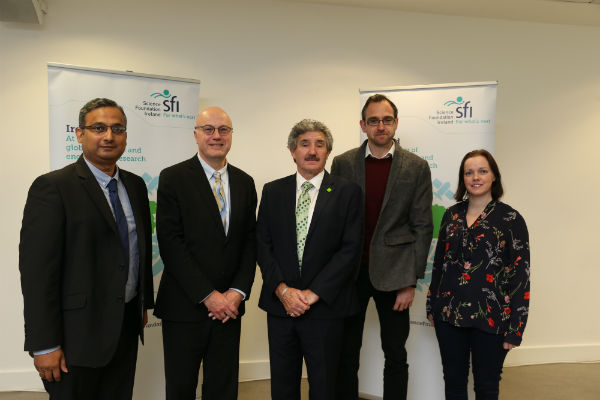
Minister of State for Training, Skills and Innovation, John Halligan TD, announced €22.3 million in research funding for 40 major research projects. The funding is distributed through Science Foundation Ireland’s Starting Investigator Research Grant (SIRG) and Career Development Award (CDA) Programmes. With awards ranging from €450,000 to €877,000 over four years, the projects funded will support nearly 100 researchers from seven countries.
The Tyndall winner are as follows:
Dr Santosh Kulkarni (Principal Investigator)
Title of research: Advanced Power Magnetics Programme for High Efficiency Power Supplies
Abstract: ‘The trend towards miniaturisation and increasing functionality of embedded electronic components is creating new challenges in the fields of electronic engineering and materials science. One of the principle limiting factors inhibiting device miniaturisation is presently posed by the large sized power processing units. The passive electronic circuit elements typify the problem, where size
reduction poses a highly non-trivial issue to be surmounted. To this end discrete soft magnetic thin films based passive components(inductors, transformers) with low loss at high-frequency have recently become focus of intensive studies due to their significance in a range of power applications. The emergence of wide bandgap materials has enabled development of power circuits with faster switching speeds, in turn facilitating passive miniaturisation. However, the existing ferrite based passive technology, while highly efficient, does not allow for further miniaturisation due to their low saturation property. SFI funded SIRG project ADMAPS builds on key achievements from CCAN funded NanoMaPS and ongoing EI funded CF project PreMag. While, these projects demonstrate the performance of amorphous/nanocrystalline soft magnetic thin film alloy systems as possible replacement for ferrites, ADMAPS will address the fundamental challenges in developing new alloy systems based on Bulk Metallic Glass systems to deliver a high performance power magnetics material. This project proposes to address four critical challenges in the realisation of a high performance discrete magnetic passive component,(1)ultra low-loss Bulk Metallic Glass(BMG) soft magnetic alloy,(2)optimized BMG composition through modelling,(3)shape independent thin-film power loss characterization system,(4)offline power topologies using discrete thin film alloys.’
Funding: €508,000
Team members: Dr. Santosh Kulkarni (Principal Investigator), Prof. Cian O’Mathuna (Mentor) & PhD student.
External collaborators: Dr. Plamen Stamenov, AMBER & Trinity College Dublin

Dr Jian Zhao (Principal Investigator)
Title of research: Technologies towards Flexible High-Capacity Optical Networks
Abstract: The ever-increasing traffic demands are placing a series of imminent challenges to optical networks: the limitation of capacity and transmission reach imposed by fibre nonlinearity in long-haul and long-metro networks; adaptive provisioning and switching of channels/sub-channels with variable bandwidth at both network edges and re-configurable add/drop nodes in metro networks; high-security and adaptive-data-rate communication to deliver a variety of services in multi-user access networks. This project will propose three technologies with advantages to address the challenges in long-haul, metro, and access networks, respectively. The first work package (WP) studies a modified phase-conjugate twin wave scheme, patented by our team, for fibre nonlinearity mitigation in core networks. This technology is highly promising to reduce the complexity and/or greatly enhance the spectral efficiency (SE) compared to other mitigation schemes. Task 2.1 in WP2 applies our pioneering optical offset quadrature-amplitude-modulation orthogonal frequency division multiplexing (OFDM), whose transmission advantages were investigated in our previous works, to network scenarios including both transmission and flexible add/drop nodes. Task 2.2 proposes a novel chirp-spread OFDM to realize secure communication with enhanced SE in access networks. Through the investigations, this project aims to not only achieve scientific excellence via high-quality publications and international collaborations but also create industry-relevant technologies to demonstrate economic value of SFI-funded research.
Funding: €877,000
Team members: Dr. Jian Zhao (PI), Prof. Paul Townsend (Mentor)
Collaborators: Dr Fatima Gunning (Tyndall), Prof. Andrew Ellis (Aston University, UK), and Prof. Lian-Kuan Chen (The Chinese University of Hong Kong, Hong Kong)
Announcing the awards, Minister of State for Training, Skills and Innovation, John Halligan TD said; “This investment in the SFI SIRG and CDA Programmes allows researchers to advance their research investigations and continue developing their careers. These researchers will be the next leaders of research in Ireland, shaping the research community both here in Ireland and internationally. The nine industrial collaborations linked with these awards provides industry with access to the emerging research expertise found throughout Ireland. Collaborations at these early career stages will help establish relationships which will advance Ireland’s economy, society and reputation for research excellence now and in the future.”
Professor Mark Ferguson, Director General of Science Foundation Ireland and Chief Scientific Adviser to the Government of Ireland welcomed the announcement saying; “Science Foundation Ireland places a heavy emphasis on supporting researchers at every stage of their careers. The SIRG and CDA awards help early and mid-career researchers develop essential skills and track records necessary to become the next generation of research leaders in Ireland. I have high expectations for these projects and look forward to these teams contributing to the advancement of Ireland’s international reputation in areas such as energy, materials, technology, and health.”
